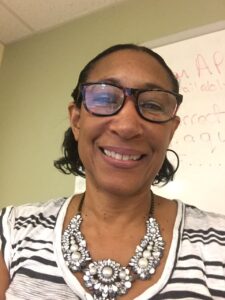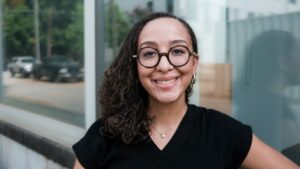Summer is over, school is back in session, and fall is just about here. There is a lot going on in the world today: earthquakes, flooding, fires, shootings – one disaster after another. The things that seem to be so important are not so important anymore.
Thankfully in the midst of trials, there is still some good in the world today. In this issue of the Byline, we feature two Black journalists who have had different experiences throughout their careers, yet they love what they are doing as media professionals today and we are excited about it!
How Journalism Shows Up in Other Career Industries with Janita Poe
 (Pictured: Janita Poe)
(Pictured: Janita Poe)
By
Mya Grant
As journalists, we take on many hats and learn many skills that can take us beyond a career in media. Many affluent journalists have non-media related businesses and side jobs and even find a way to use their skills in other industries, like Janita Poe, the current News Manager at the Southern Regional Education Board (SREB).
Like many others in college, Poe was trying to figure out what exactly she wanted to do for her career. During high school, she excelled and enjoyed her language and history classes but wasn’t involved in any student media. While attending Florida State University, she closely volunteered with the Black student union organization and became editor of their newspaper. That’s when it sparked her to pursue a career in journalism and continue her education with earning her master’s degree from The University of Georgia and a doctorate from Georgia State University.
Poe’s journalism career began in the early 90s at the Chicago Tribune where she covered the education beat. During her time working there, Poe mainly covered news about the Chicago Public Schools and the political initiatives taking place during a mayoral election.
Upon moving back to Atlanta, Poe tested her editing skills at the Atlanta Journal Constitution (AJC) and became a senior business reporter. Not only did Poe cover business and the CityLife column, she was also given the responsibility of editing stories for the education beat.
“I’ve always had an interest in education and languages and the global world,” said Poe.
Poe’s love for education and global languages grew immaculately during the time she was earning her doctorate’s degree from Georgia State University and celebrating her 60th birthday. While visiting France, she had the opportunity to tutor a young boy in English while being hosted by his family for three months. Poe considers them her adopted family and used that opportunity to expand on what she already loved.
With her main focus being and doctorate’s degree being in global communications, Poe used her skills and knowledge within the education field to participate in many studies around the world on the English language and other language barriers among students and in the education system.
“Education has always been in the mix,” said Poe. “All the way through my PhD studies.”
Even early on in her career at the AJC, Poe wouldn’t take certain opportunities and promotions that would take her away from the education beat. It was more than having a niche, it was Poe finding and actively working towards her passion.
Over the course of her career, Poe has worn many hats and learned many things that would propel her forward into her career at SREB. As news manager, she’s able to use skills she’s picked up along the way that easily transfer over into her day-to-day responsibilities.
“I feel that I have learned so much by being out of one stream,” said Poe. “And being able to jump in different streams and meet people and understand how different segments of society operate… and because of that I’m a better person for it.”
Much of Poe’s work consists of making the public aware of what SREB is about and improving the quality of education in the South. One of Poe’s greatest accomplishments within her newfound role is that she pitched and executed a 75th anniversary digital project for SREB. She continues to excel in her role that closely aligns with her passion as well as volunteering her free time to other organizations across Georgia.
Follow Janita Poe on X (formerly known as Twitter) and learn more information about the Southern Regional Education Board.
________________________________________________________________________________
AJC’s Business and Economy Reporter Shares Her Journalism Journey
 (Pictured: Mirtha Donastorg)
(Pictured: Mirtha Donastorg)
Photo Credit: Christopher Hollis
By
Radhiya Alston
Sometimes what we think we want to do in life is not where we end up. Mirtha Donastorg, the current Economy and Business Reporter at the Atlanta Journal Constitution (AJC), shares her story on how she became a journalist. She attended North Carolina State where she earned a degree in biology in 2016. During her junior year, Donastorg decided that journalism was what she wanted to do. In 2014, she started her yearlong stay in Paris, France. While in Paris, she worked at a small magazine named Assistant Magazine. At the magazine, she wrote, edited, did interviews, and assisted on photo shoots.
When Donastorg arrived home from Paris in 2015, she knew that she had to explain to her parents that she was now interested in doing journalism. Her father told her that if this was what she wanted to do, then taking journalism classes at The University of North Carolina Chapel Hill would be in her best interest. That is exactly what she did her senior year. She threw herself in to journalism classes and worked at the campus radio station WKNC.
“It was not easy letting my immigrant parents know I now wanted to do journalism,” she said. “I would take my biology classes at North Carolina State, then travel 30 minutes to get to my Audio Journalism class at The University of North Carolina,” she explained.
During Donastorg’s senior year in college, she met the Vice President of CNN who was on her campus recruiting for internships. Although she did not receive an internship, Donastorg secured her first paid job at CNN after she graduated. She worked as a researcher for The Row, which is an editorial standard edition division of CNN. She went through scripts that were to air on any CNN Network. When going through the scripts, Donastorg would fact check, look for accuracy, and fairness before anything went on air.
“It was like being in grad school,” she said. “I learned so much working for The Row.”
After three years at The Row, Donastorg transferred to CNN Digital. Here she worked as an Associate Producer. One of Donastorg’s primary roles was to send out breaking news alerts. She said any alerts that went out between 2019-2021, most likely she was behind it. In 2021 Donastorg left CNN after almost five years to work for The Plug as a corps member with Report for America. The Plug was a small publication, where Donastorg was the Historically Black College and Universities (HBCU) Innovation writer and editor. At this publication she helped start and grow the HBCU Innovation beat, where she explored start-up initiatives. Donastorg felt while in this position, it was important to tell the often-uncovered stories of what was going on at HBCU campuses.
In March of 2023, The Plug dissolved. Soon after leaving The Plug, she began working for the AJC. As the Economy and Business Reporter, Donastorg covers stories about Black and minority led businesses and Black wealth. She explained that it is important to her that she is informative and gives readers a deeper understanding of who or what the topic is. She also talked about her professional growth that has taken place in the five months she has been at the AJC. She is grateful for working in a supportive newsroom and having a great editor. For what the future holds, she wouldn’t mind writing a book or doing something on the radio again. Donastorg’s main focus is to continue to focus on accountability reporting and perfecting her craft. You can find all her articles online at www.AJC.com.
________________________________________________________________________________
ATTENTION AABJ MEMBERS!!! Board elections are coming up soon. If you are interested in serving on AABJ’s Board for the 2024-2026 term, visit www.aabj.org for more information or visit AABJ on our social media (Facebook, Instagram) for more details.
This issue of the Byline was edited by Tianna Faulkner, Vice President of Print for the Atlanta Association of Black Journalists (AABJ).